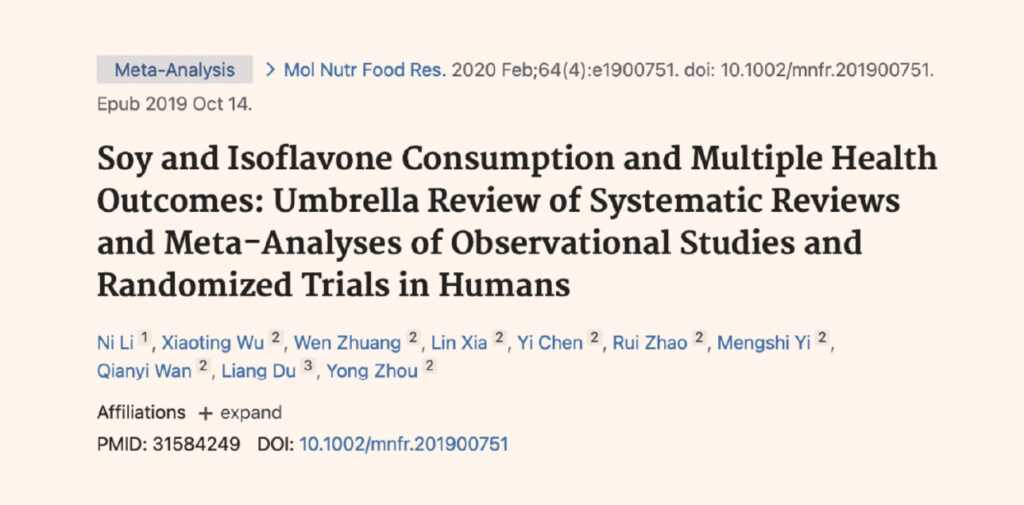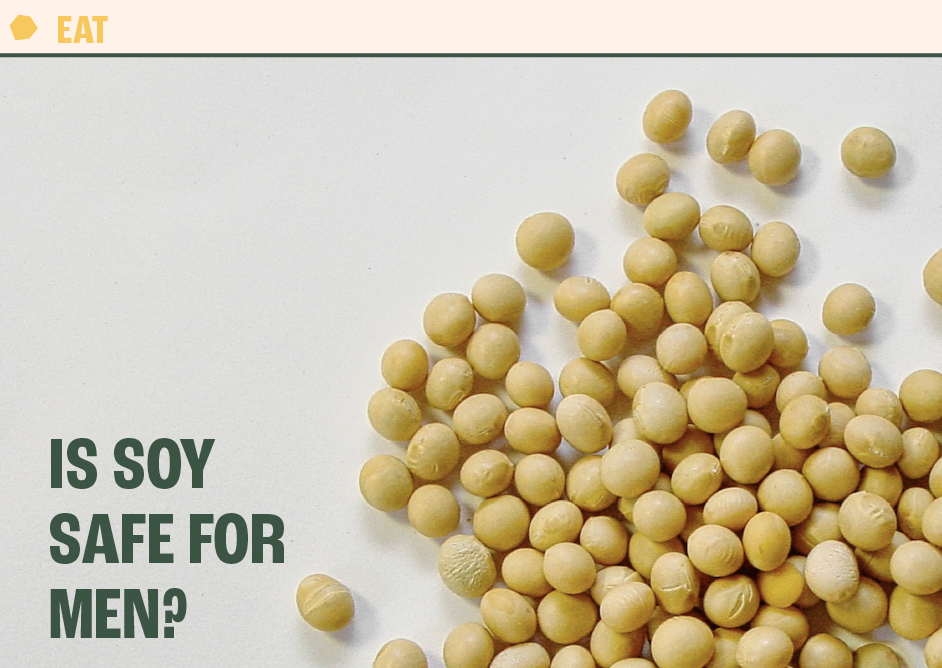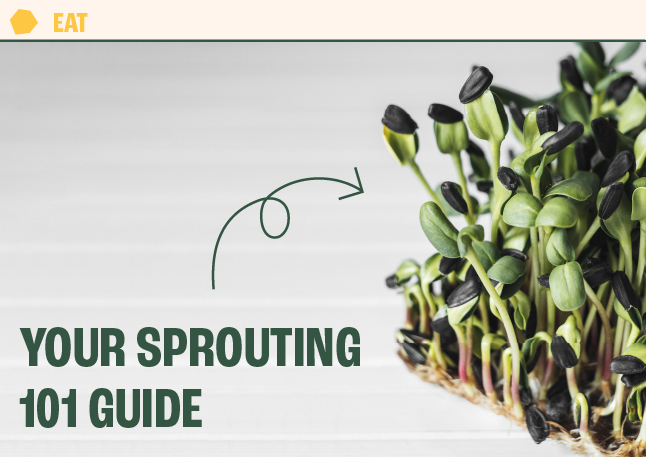Here’s the truth about soy for men.
Soy foods are often demonized as being hormone disruptors in men. If you’ve hung around long enough on the socials, I’m sure you’ve heard tofu, soy milk, edamame, tempeh, and so forth are the perfect recipe for tanking your testosterone. I’ve even heard statements as extreme as “eating soy is basically male castration!”
This perspective creates a tricky situation for those working towards a whole-food, plant-based diet. Soy provides a reliable source of low glycemic plant protein, along with fiber, iron, potassium, and, in the case of fermented soy foods like tempeh, a boost of probiotics depending on preparation. In addition, it’s well established that substituting plant proteins like soy, for animal protein, especially red meat, improves markers of cardiovascular health, reduces the risk of type 2 diabetes, and promotes greater longevity. (1, 2, 3)
The fear surrounding male hormones and soy is over how the isoflavones in soy act in the body. Isoflavones are classified as phytoestrogens, essentially a plant form of estrogen. Now right off the bat, you may be tempted to feel confirmed in your understanding that soy is harmful for men, but bear with me.
Phytoestrogens are NOT the same as the human hormone estrogen and how they function in the body depends on many factors, including hormone levels, age, health status, and type and amount of isoflavones consumed. A closer look at the literature reveals many studies that question the safety of soy consumption rely on rodent, cattle, or in vitro studies, which as we know have minimal applicability to people. (4, 5)
Yet, I still hear the repeated message: “Stay away from soy foods bro!” It’s a big claim, but where’s the evidence?
In 2010 a Meta-analysis was performed on 15 placebo-controlled human clinical interventions looking at soy protein and isoflavones often called phytose. They found no significant effects on total testosterone, free test, sex hormone binding globulin or the free androgen index. (6)
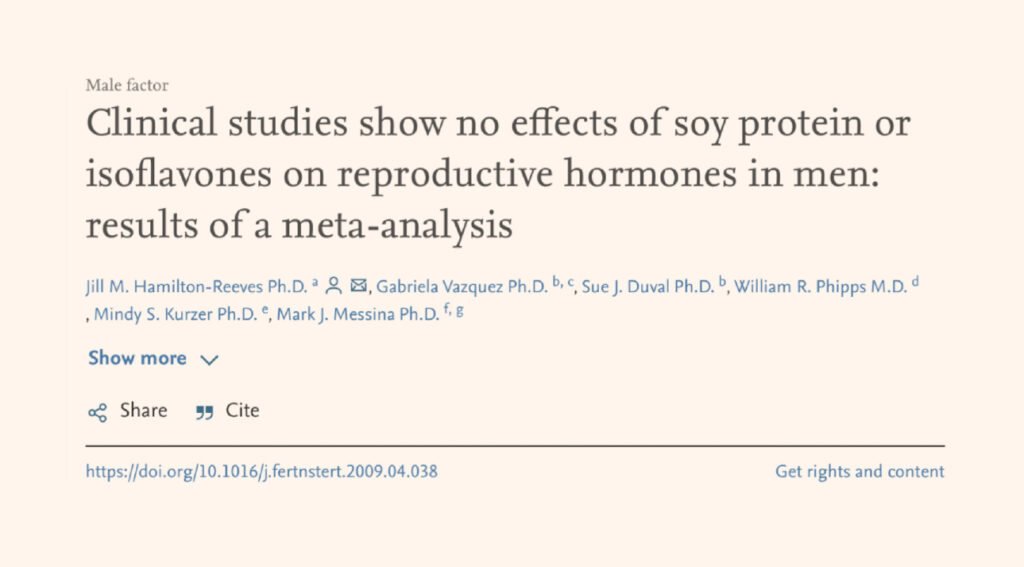
And then, just 2 years ago, in 2020, an updated meta-analysis was performed, this time including 38 clinical trials, 4 of which were over 12 months long. Data from this study support the 2010 paper. When you compare no or low soy intake to the equivalent of 3-4 serves of soy per day, there is no significant effect on testosterone, estrogen or sex hormone binding globulin. (7)
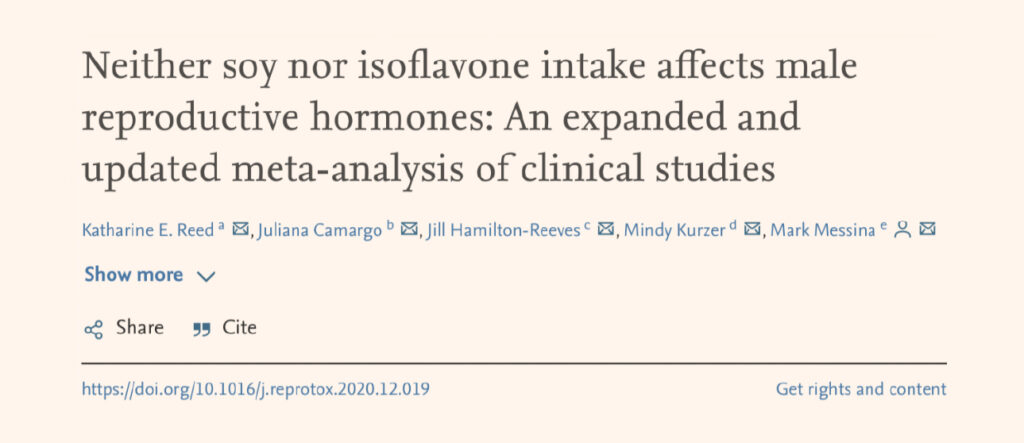
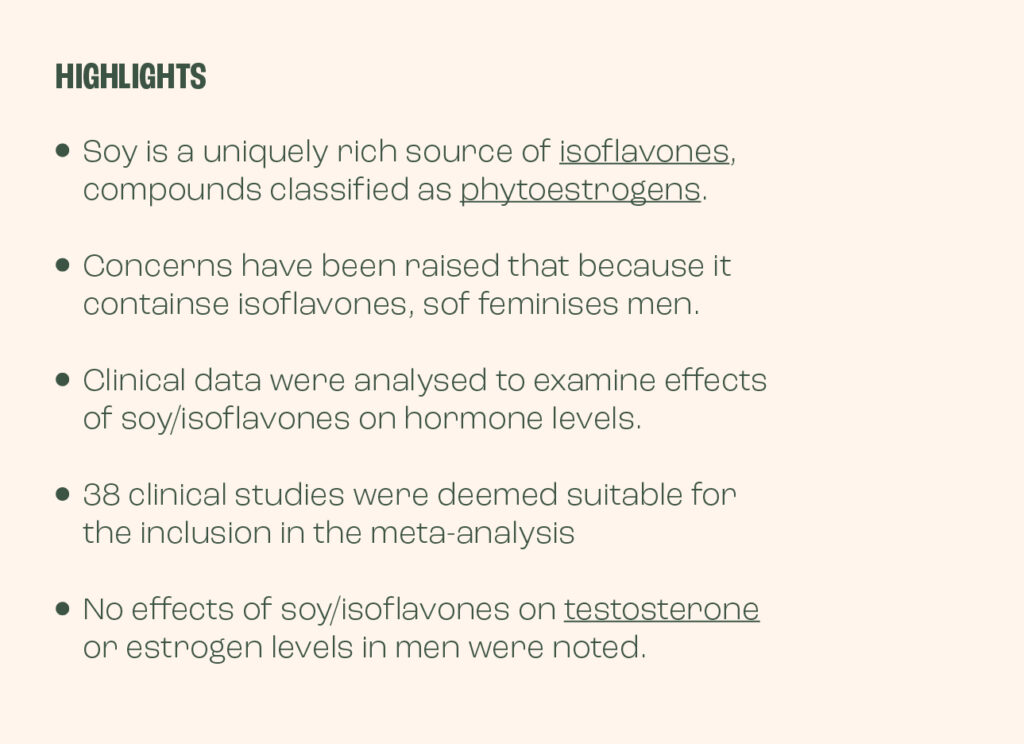
In light of this wealth of evidence, why does this misinformation persist? Well, it’s true that isolated cases exist where men experienced side effects from excessive intake of soy foods. (8) But, the keyword here is excessive. Imagine drinking 3 liters of soy milk a day! Any food eaten in such excess is bound to cause unpleasant side effects.
But, a reasonable 3-4 serves of soy foods per day isn’t going to lead to feminizing effects in men.
What these foods will likely do, however, is help you achieve an optimal protein intake, improve your blood lipids and achieve a healthy apoB level and lower your risk of chronic disease. Their potential to protect health carries a much greater weight of evidence. (9, 10)
Friends, I hope you are enjoying these brief fact-check videos and blogs. My goal is to give you a quick rundown of an issue and provide a reliable takeaway you can immediately put to use. As always, nutrition topics are complex, and there is much more detail to explore. For those of you interested in delving deeper, stay tuned to my podcast and website for future offerings.
-Simon
References:
- Li SS, Blanco Mejia S, Lytvyn L, et al. Effect of Plant Protein on Blood Lipids: A Systematic Review and Meta-Analysis of Randomized Controlled Trials. J Am Heart Assoc. 2017;6(12):e006659. Published 2017 Dec 20. doi:10.1161/JAHA.117.006659
- Malik VS, Li Y, Tobias DK, Pan A, Hu FB. Dietary Protein Intake and Risk of Type 2 Diabetes in US Men and Women. Am J Epidemiol. 2016;183(8):715-728. doi:10.1093/aje/kwv268
- Naghshi S, Sadeghi O, Willett WC, Esmaillzadeh A. Dietary intake of total, animal, and plant proteins and risk of all cause, cardiovascular, and cancer mortality: systematic review and dose-response meta-analysis of prospective cohort studies. BMJ. 2020;370:m2412. Published 2020 Jul 22. doi:10.1136/bmj.m2412
- Domínguez-López I, Yago-Aragón M, Salas-Huetos A, Tresserra-Rimbau A, Hurtado-Barroso S. Effects of Dietary Phytoestrogens on Hormones throughout a Human Lifespan: A Review. Nutrients. 2020; 12(8):2456. https://doi.org/10.3390/nu12082456
- Messina M. Soy and Health Update: Evaluation of the Clinical and Epidemiologic Literature. Nutrients. 2016; 8(12):754. https://doi.org/10.3390/nu8120754
- Hamilton-Reeves JM, Vazquez G, Duval SJ, Phipps WR, Kurzer MS, Messina MJ. Clinical studies show no effects of soy protein or isoflavones on reproductive hormones in men: results of a meta-analysis. Fertil Steril. 2010;94(3):997-1007. doi:10.1016/j.fertnstert.2009.04.038
- Reed KE, Camargo J, Hamilton-Reeves J, Kurzer M, Messina M. Neither soy nor isoflavone intake affects male reproductive hormones: An expanded and updated meta-analysis of clinical studies. Reprod Toxicol. 2021;100:60-67. doi:10.1016/j.reprotox.2020.12.019
- Martinez J, Lewi JE. An unusual case of gynecomastia associated with soy product consumption. Endocr Pract. 2008;14(4):415-418. doi:10.4158/EP.14.4.415
- Nachvak SM, Moradi S, Anjom-Shoae J, et al. Soy, Soy Isoflavones, and Protein Intake in Relation to Mortality from All Causes, Cancers, and Cardiovascular Diseases: A Systematic Review and Dose-Response Meta-Analysis of Prospective Cohort Studies. J Acad Nutr Diet. 2019;119(9):1483-1500.e17. doi:10.1016/j.jand.2019.04.011
- Li N, Wu X, Zhuang W, et al. Soy and Isoflavone Consumption and Multiple Health Outcomes: Umbrella Review of Systematic Reviews and Meta-Analyses of Observational Studies and Randomized Trials in Humans. Mol Nutr Food Res. 2020;64(4):e1900751. doi:10.1002/mnfr.201900751

